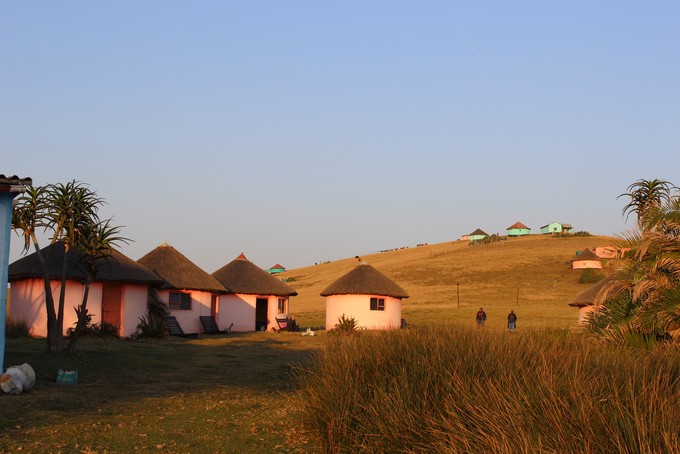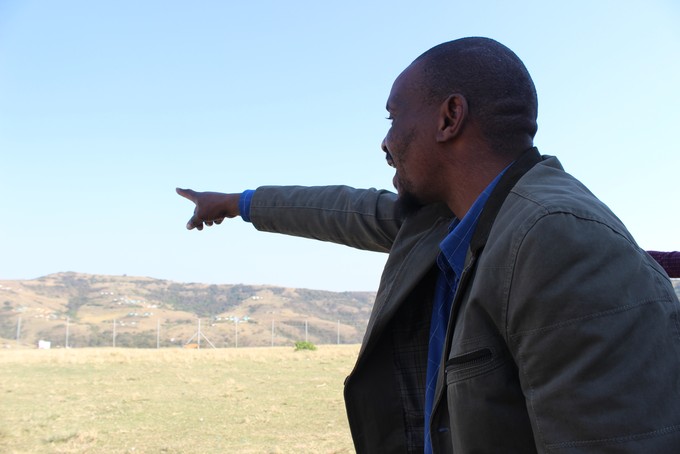
Despite its beauty, Xhora Mouth Administrative Area in OR Tambo District is one of the poorest and most under-served areas in the country. Photo courtesy of SECTION27
31 August 2016
Our ward councillors are of vital importance to meeting the needs of under-resourced areas. Yet, our experience of working in the Eastern Cape reveals that they are not listening to the people.
The people of Xhora Mouth are weary. They are tired of talking to councillor after councillor, all promising change after the elections, yet fail to deliver.
Situated in the Mbashe Municipality in the Eastern Cape, 100 kilometres from Mthatha, the Xhora Mouth Administrative Area consists of four villages: Mgojweni, Folokwe, Nqileni and Tshezi.
Residents struggle to gain access to quality healthcare. And by access, they mean a clinic they can actually get to without walking for hours or paying hundreds of rands to hire a taxi. They have asked the Eastern Cape Department of Health for a clinic close to their village, but have been brushed off and told to use Nkanya Clinic, the only health facility in the administrative area. It is a two-and-a-half hour walk on foot over hills and across a river, on a good day and if the person is strong. It is a strenuous trip for a healthy person, but often impossible for a person desperately in need of health care services.
The Bulungula Incubator is a health facility largely run and funded by local organisations, and operated by community health workers. Transport provided by the civil society organisation enables nurses to visit the community about once a month to provide chronic medication excluding TB and antiretroviral medication to registered patients. It is basically a delivery service. They offer blood pressure and blood sugar tests, but can do little more. If patients need even a painkiller or an HIV test, they have to travel to Nkanya Clinic – an arduous journey.
Sometimes, a family member too ill to walk will be transported in a wheelbarrow, all the way to the clinic. In rainy weather the terrain becomes slippery and muddy. The trenches in the path are then deep and the river wide, making the long journey even more treacherous.
The nearest hospital is Madwaleni Hospital, 65 kilometres away by car on a bad road. Though it appears idyllic, life in Xhora Mouth is fraught with hardship. Many of the residents are unemployed, mirroring the Mbashe District’s 93% unemployment rate. A third of the households in the district survive on less than R800 a month, and are heavily reliant on state grants.
For more than a decade, residents have asked the provincial health department for a clinic, but their call has fallen on deaf ears. Community members report that they have done everything asked of them. When they approached the department in 2007, they were told to find a piece of land that could be the site of their clinic. They complied. The land was cordoned off, yet plans for construction have not been forthcoming.
The people of Xhora do not have cars and so when someone is injured, falls seriously ill or a woman goes into labour, they have no choice but to call an ambulance. But ambulances rarely respond quickly. In fact, there is no ambulance servicing the area.
As a result people die, often avoidably. Residents have given up calling ambulances, and instead pay exorbitant fees to taxi drivers who charge as much as R800 for a single trip to the hospital. Families must then choose between buying food and gaining access to healthcare services. They are mostly left with no choice but to borrow money to fund the transport.

Repeated requests for ambulances made to the health department were ignored, prompting residents to lay a complaint with the South African Human Rights Commission in 2013. The Commission finally conducted hearings into ambulance services in the province in March 2015.
The Eastern Cape Health Crisis Action Coalition (ECHCAC), a coalition of organisations and individuals working to ensure better access to health in the province, has been working with the community to ensure that the department meets its constitutional obligation to take legislation and other measures to provide the necessary healthcare services.
On a recent visit, the ECHCAC team found that little has changed. A man who had suffered a serious back injury and was wheelchair-bound had been forced to hire a private vehicle to transport him to hospital for his monthly check up. A woman who went into labour in the middle of the night gave birth at home because the ambulance did not arrive.
The department reported that it would purchase 141 ambulances, suitable for the terrain, for use across the province. Provincial Emergency Medical Services (EMS) General Manager, Sibusiso Zuma, says that these will be delivered in November 2016. He however could not confirm whether one of these ambulances will be stationed in Xhora Mouth as the residents have requested on numerous occasions. He cites security and policy issues.
Following the hearings, the SAHRC visited Xhora together with representatives from the Department. Xhora Mouth’s Chief NoOfisi Gwebindlala says two sites for parking the ambulance (one in a secure car park) were identified in September 2015 and pictures were sent to the Department and the SAHRC. The Department has so far failed to respond.
In its report to the Human Rights Commission, the provincial health department said it had developed an EMS policy but had not consulted communities despite the clear public interest in the issue.
The provincial health department continues to fail the people of Xhora Mouth.
It is now up to the newly elected local councillors to listen to the people and work to ensure that their basic right to access healthcare is met. As the dust settles on what have been proclaimed the most hotly contested local government elections in the history of South Africa’s young democracy, the real work of delivering services to the people must begin. Let it begin in Xhora Mouth.
Views expressed are not necessarily GroundUp’s.